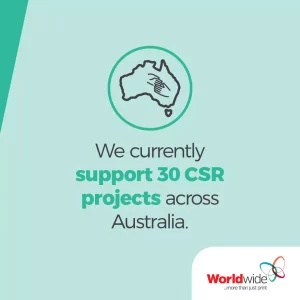Menu
Menu

A Human Chain of Empathy
Do you want to learn more about Corporate Social Responsibility (CSR)? Do you want to know what it is and why more organisations are integrating it into their business operations and day-to-day practices?
Well, you’ve come to the right place.
Let’s start with the basics. What is CSR?
According to the Australian Human Rights Commission, CSR is understood to mean that “corporations have a degree of responsibility not only for the economic consequences of their activities, but also for the social and environmental implications”.
While it is an important element of an organisation’s ethos and practice, CSR isn’t a new concept. Therefore, it doesn’t have the same emotional pull that it might’ve had a decade ago.
It has evolved from being an added bonus to an expectation. So, as CSR evolves, businesses need to evolve with it.
We can focus on language as a starting point. Instead of using terms such as responsibility and accountability, it is time we gave it a more comforting touch, just like its endeavours.
We often hear people say, “Don’t mix business with emotions!” But why shouldn’t we? Emotions keep a business model alive, empathetic and sensitised towards its people. And CSR allows us to remain connected with our people and maintain strong, healthy relationships with them.
The basic tenet of CSR is thinking about the last person in the queue. It is truly a win-win scenario for companies and consumers alike, given the benefits involved. At Worldwide, our CSR ventures range from caring for underprivileged children to the homeless, from the elderly to cancer patients, which has made us feel truly happy.
Given what the world has been through over the past 24 months, we need CSR and its emotional components now more than ever before.
Everyone has been impacted by the COVID-19 pandemic in some way over the last two years, be it financially, emotionally or physically. Moreover, 2021 has been even more difficult for us Aussies, particularly those on the East Coast.
So, as business owners, we ought to stay strong and committed to our people and help them overcome their trauma. After all, it is the community that made us what we are today. We need to remind ourselves that each time they trusted us when we needed them to grow our business. Now it is our turn to give back.
Following these principles, a number of noteworthy brands did their bit to give back to those in need.
Here at Worldwide, we engaged in several community causes by donating over $50,000 in 2020 alone.
One of Australia’s leading supermarket brands, Coles, has been exemplary with its CSR initiatives. During the COVID-19-stricken financial year of 2020, the popular supermarket chain contributed more than $139 million to the community through various measures, including fundraising, food donations, financial contributions and disaster relief.
In 2020, another food brand, Nestlé, extended additional support worth $2 million where it partnered with Foodbank Australia to distribute food products to the vulnerable sections of the community.
Examples such as these are not just limited to the pandemic phase but rather go much beyond.
Our very own ‘Maccas’ is also committed to better health and well-being of the children in our community. McDonald’s celebrates McHappy Day every year to raise funds for Ronald McDonald House Charities (RMHC), supporting children and families struggling with serious illnesses.


Repeatedly misunderstood as unidirectional, the trending term of CSR has a much deeper meaning to it. It not only benefits the community, but also extends to business owners who are responsible for executing these initiatives.
Creating a positive brand image is crucial in today’s world of social media and digital marketing. Now is the time for businesses to understand the power of CSR initiatives and what they can do for the organisation’s reputation. The more a business model contributes to the betterment of the society, the better its public image. Both individuals and organisations value companies who care and show empathy towards local issues.
Another benefit of CSR is a satisfied and happy workplace. That’s right! CSR can benefit an organisation both externally AND internally. A company’s contribution to the community and environment also reflects how a current or prospective employee would think about its culture. A great office culture results in a happy workplace and, in turn, profits.
A company’s corporate values are also defined by its CSR programmes. Our clients, whether they are part of the community or an organisation, are loyal to a company if they believe that the business they are partnering with shares the same social and environmental ethics.
At the same time, Australia’s state and national governments have also pitched in to encourage the private sector to come forward. Liberal tax incentives are now available for companies engaging in CSR activities.
Studies have found that consumers don’t mind paying extra for a company’s products if they can see how socially responsible it has been – ticking all the boxes in one stroke!
"*" indicates required fields